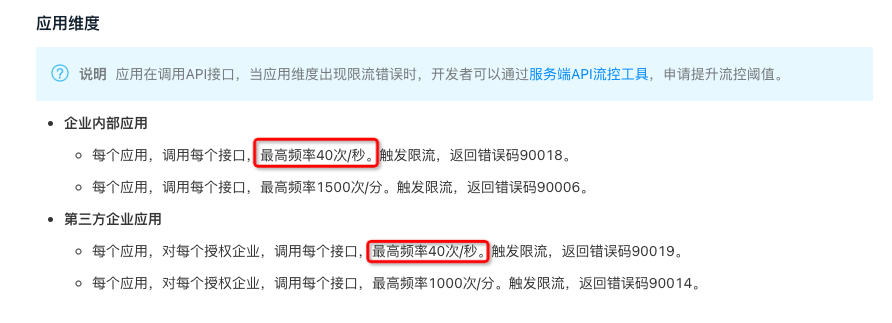How to handle DingTalk open platform YIDA server API throttling
This article introduces the trigger conditions and solutions of API throttling on the server side of the open platform YIDA DingTalk
Trigger condition
To prevent YIDA server load exceptions caused by application errors, by default, each YIDA server API interface varies according to complexity, all calls have different frequency limits (for more information, you can send API document addresses for technical support). When any dimension limit is exceeded, flow limiting may be triggered. Common response error codes:failure.operation.requestTooFast,failure.operation.tooManyVisitors
- Single-application QPS throttling:Each application calls each interface. When the maximum frequency is exceeded, the throttling is triggered.
- Single-organization QPS throttling:Each organization calls each interface. When the maximum frequency is exceeded, the throttling is triggered.
- Global QPS throttling: due to the security protection policy of the YIDA interface, the number of calls per second is limited.All YIDA Organizational ApplicationsIf the number of simultaneous calls to an interface exceeds the limit of the number of calls per second, a response error is triggered.
Solution
- Universal: Because the qps throttling limit is 1 second, when a throttling error is encountered, you can sleep for 1 second in the program and continue execution.
- Peak Shifting Strategy: some programs that regularly adjust the YIDA API can avoid the peak time of the hour, such as running regularly at the time of the hour +10.
FAQ:
Q: DingTalk is charged for calling OpenAPI on the open platform. Are interfaces involving YIDA charged repeatedly?
A: There will be no repeated charges. The details are as follows:
YIDA service call APIs can be used in two scenarios:
- YIDA is a SaaS application that calls the DingTalk function interface through the product function [that is, the YIDA official connector, such as obtaining DingTalk attendance data].PolicyLimits.
- The customer side established enterprise self-built applications on the open platform DingTalk, directly called in its own external system[YIDA interface list]]Content in (suchBy calling the YIDA openAPI interface in the customer's self-built system, the application data built on the YIDA is synchronized to the self-built system.), not subjectPolicyLimits.

Q: Does the number of YIDA API calls take up to DingTalk of open platform calls?
A: It does not occupy DingTalk open platform calls. Because YIDA-related business call APIs are not affectedPolicyLimits.
- Scenario 1: YIDA is used as a SaaS application to call the DingTalk function interface [that is, the YIDA official connector, such as obtaining DingTalk attendance data].PolicyLimits.
- Scenario 2: the customer side has established enterprise self-built applications on the DingTalk open platform., directly called in its own external system[YIDA interface list]]Content in (suchBy calling the YIDA openAPI interface in the customer's self-built system, the application data built on the YIDA is synchronized to the self-built system.), not subjectPolicyLimits.
Q: Does the QPS limit published by the DingTalk open platform also limit YIDA of the interfaces?
A: The QPS restrictions published by the open platform on DingTalk distinguish enterprise internal applications from third-party enterprise applications. As a third-party enterprise application, YIDA also limits QPS. YIDA calls each interface of DingTalk at a maximum frequency of 40 times per second. For more information, seeCall frequency limit

Q: At the same time, I bought DingTalk professional edition and it is suitable to match. Which standard is QPS throttling implemented?
A: Because YIDA related business calls are not affectedPolicyLimits. YIDA no matter which version of the DingTalk base is purchased, the QPS standard is the highest frequency of 40 times per second.
- Scenario 1: YIDA is used as a SaaS application to call the DingTalk function interface [that is, the YIDA official connector, such as obtaining DingTalk attendance data].PolicyLimits.
- Scenario 2: the customer side has established enterprise self-built applications on the DingTalk open platform., directly called in its own external system[YIDA interface list]]Content in (suchBy calling the YIDA openAPI interface in the customer's self-built system, the application data built on the YIDA is synchronized to the self-built system.), not subjectPolicyLimits.
Q: Does the QPS throttling of YIDA support separate expansion? How do I charge?
A: customers do not support separate expansion except for the dedicated version.